The Best Lobster Risotto Recipe (Easy and Creamy)
This creamy Lobster Risotto recipe is the perfect dish for a special occasion or, let’s face it, a regular Wednesday night dinner! With a rich lobster flavor and perfectly cooked risotto (al dente, of course), this creamy risotto will quickly become one of your favorites! For best results, use quality ingredients and fresh lobster. If you’re looking for more tasty pasta dishes, I have plenty here.
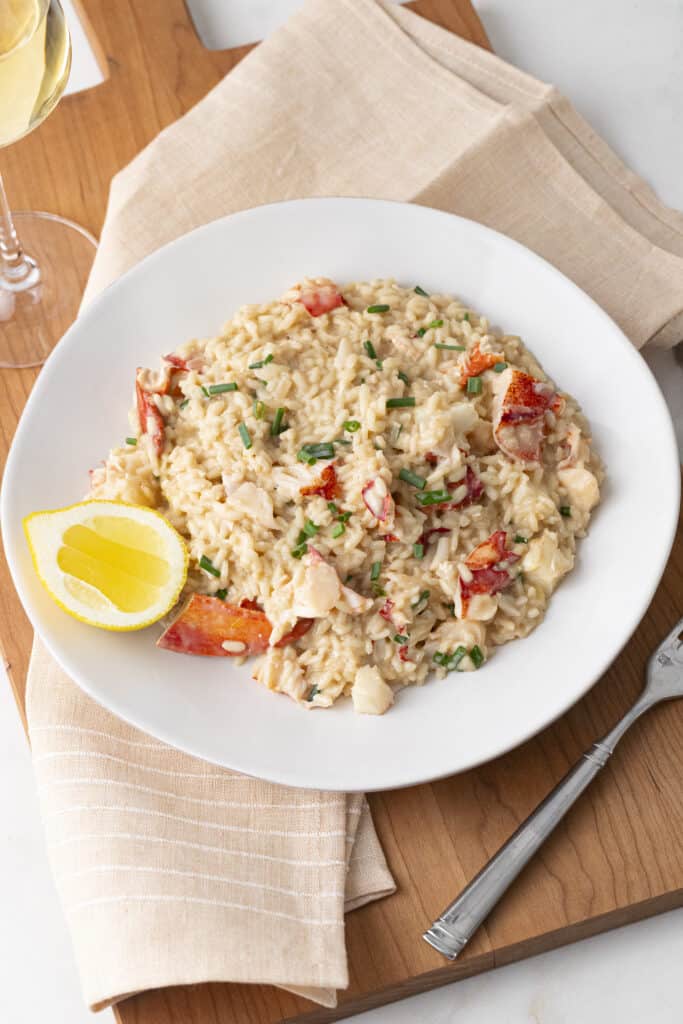
This perfect risotto is creamy comfort food with influences from New England, although risotto is a classic Italian dish. Big chunks of butter lobster are distributed throughout this risotto, so you get fresh lobster in every bite! Although risotto can be intimidating, this recipe is straightforward so that you get the perfect lobster risotto every time. The best part of this dish is that it’s restaurant quality, but easy to make at home!
If you’re looking for more easy lobster recipes, you’re in luck! Check out my other recipes featuring fresh lobster. Some of my other favorite recipes include my Butter-Poached Lobster, Creamy Lobster Pasta, Lobster Gnocchi, Lobster Cakes, and Lobster Gnocchi.
Table of Contents
Why You’ll Love This Recipe
- Fool-proof preparation – Mastering this recipe is a breeze. With simple steps and clear instructions, even beginners can nail it. No fuss, just fantastic results.
- Flavorful and rich – This risotto is super flavorful thanks to the combination of mascarpone and lobster stock. Creamy richness meets the subtle sweetness of lobster, creating a taste that’s hard to resist.
- Easy luxury at home – Indulge in a touch of luxury without the hassle. Mylobster risotto brings that upscale feel to your home kitchen, making it a go-to for anyone seeking a deliciously effortless meal at home.
Ingredients

- Cooked lobster meat – Pre-cooked lobster meat adds a sweet and succulent flavor to elevate your risotto. Save some larger chunks of buttery lobster for garnish to showcase the luxuriousness of the dish. You can use lobster tails or claw meat for this dish. Just make sure it is cut into small pieces. Feel free to use leftover lobster meat, too!
- Arborio rice –Toast the medium-grain rice at the beginning to enhance its nutty flavor and contribute to the overall richness. You can also use carnaroli rice.
- White wine – I use a dry white wine, specifically Pinot Grigio.
- Shallot – The shallot Imparts a mild, sweet onion flavor, enhancing the overall savory profile of the risotto.
- Chives – Chopped chives brighten up the flavors with a hint of onion and a pop of color, making your risotto visually appealing. Reserve some chives for the final garnish to add a fresh finish.
- Unsalted butter – Creamy butter adds a luxurious, velvety finish to the risotto, enhancing its overall richness.
- Mascarpone – A secret weapon for creaminess, mascarpone brings a luscious texture to each bite. Stir the mascarpone into the rich risotto slowly, ensuring it fully blends to avoid any lumps.
- Lobster stock – The secret to a deep lobster flavor is using homemade lobster stock. I always use my own stock, which I end up diluting with water. However, chicken broth is another great option! You could also use store-bought seafood stock. Last resort: you can use vegetable stock.
- Water – The water balances the liquid content, working in harmony with the lobster stock to achieve the desired flavor. My homemade stock is very concentrated, so I dilute it with boiling water instead of using all the stock.
- Parmigiano Reggiano – Real, aged Parmigiano Reggiano adds a savory, umami depth to the risotto, enhancing its overall richness. Grate the cheese just before adding to preserve its freshness and ensure even distribution.
- Lemon zest – Fresh lemon zest brightens the flavors with a citrusy note, cutting through the richness for a well-balanced taste. Zest the lemon finely, and add it at the end for freshness.
Substitutions and Additions
- Lobster meat – If lobster isn’t available, consider using high-quality shrimp for a seafood twist.
- Mascarpone – Cream cheese can be a substitute for mascarpone, providing a similar creamy richness. Use a bit less cream cheese than mascarpone for a balanced result.
- Asparagus – Include lightly blanched asparagus tips for a vibrant, crunchy element. Add them towards the end to maintain their freshness and texture.
- Pancetta crisps – Crisp up some pancetta and use it as a garnish for added depth and a hint of saltiness. Pat the pancetta dry before crisping for a satisfying crunch.
Step by Step Instructions

Step 1: In a large pan, melt 2 tablespoons of butter along with 1 tablespoon of olive oil over medium heat.
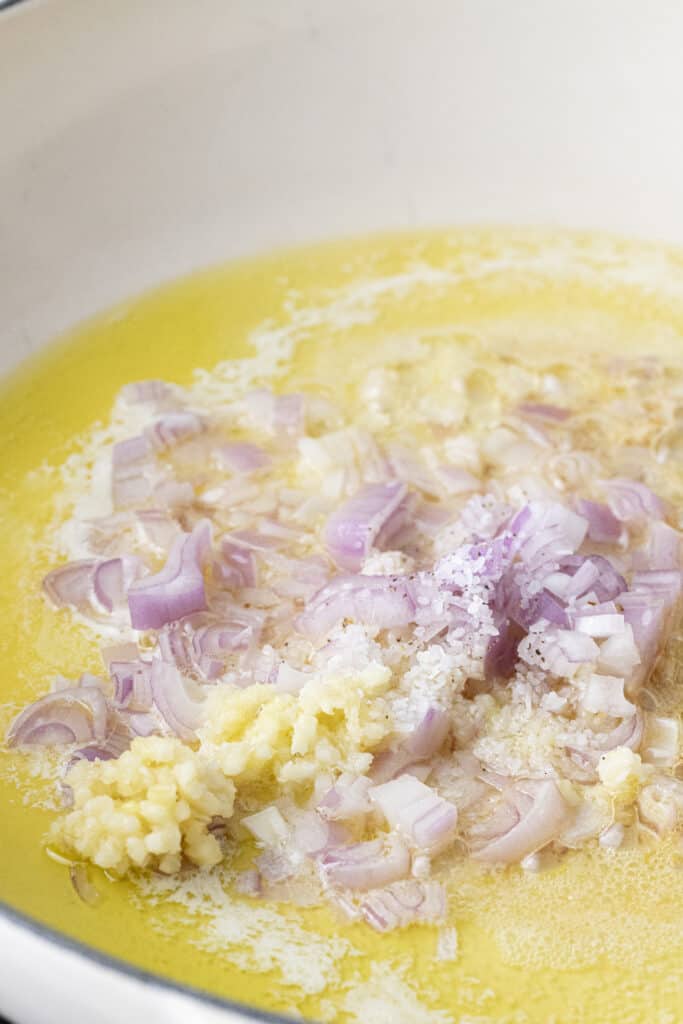
Step 2: Sauté 1 minced shallot and 4 small cloves of garlic until softened.
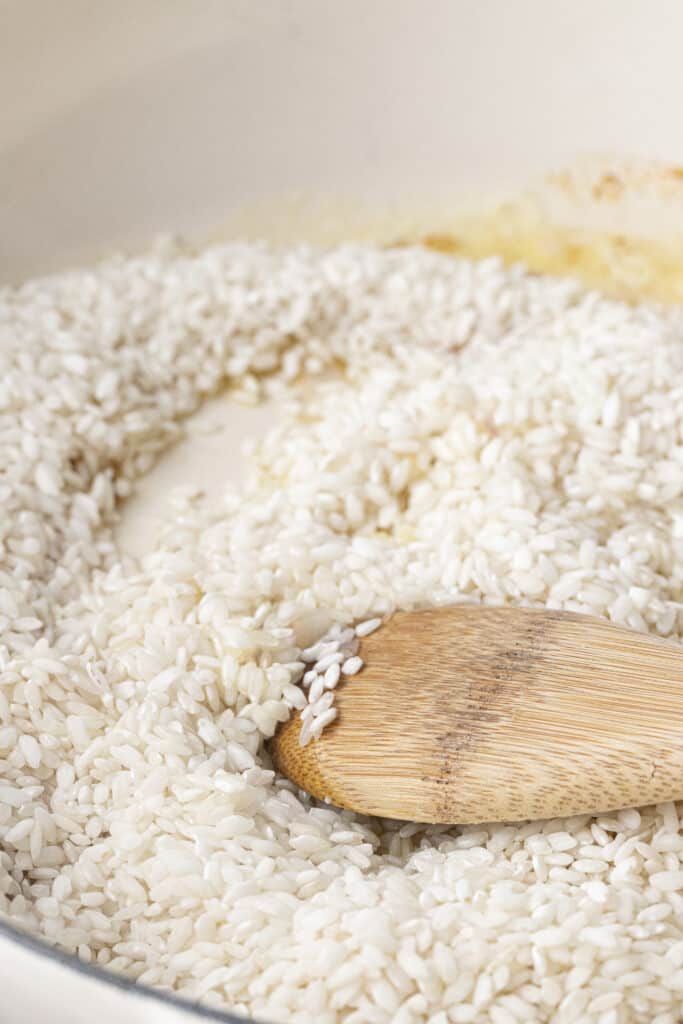
Step 3: Add 2 cups of Arborio rice to the pan, toasting it for a couple of minutes until it becomes slightly translucent around the edges.
Pour in 1/2 cup of white wine, stirring continuously until it’s mostly absorbed by the rice. Season with 1 teaspoon of salt and 1 teaspoon of pepper
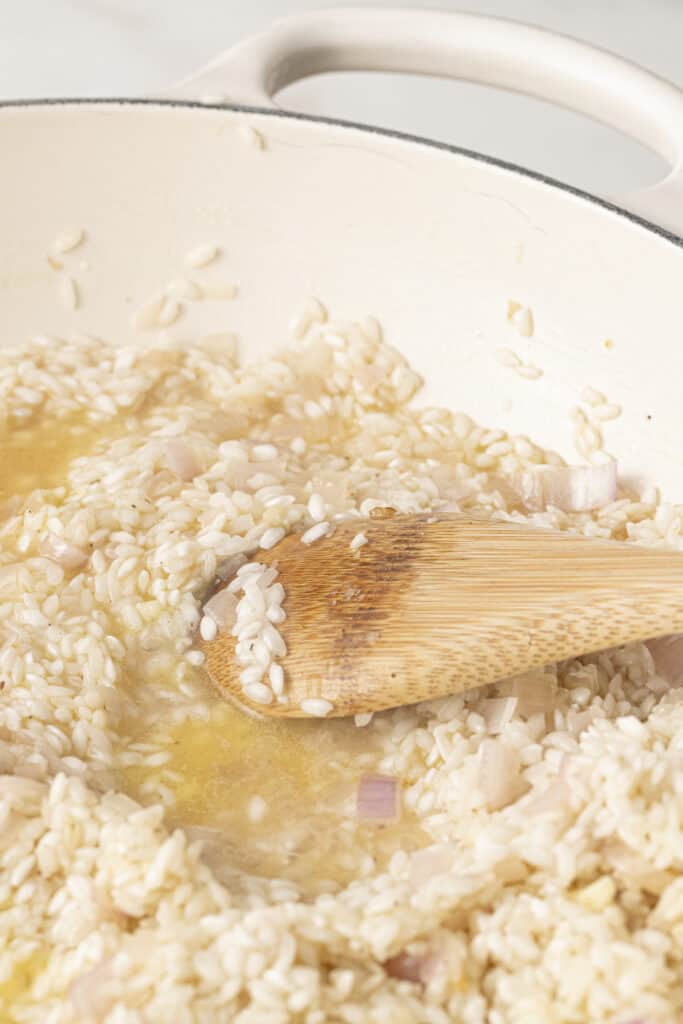
Step 4: In a separate pot, keep the lobster stock (4 cups) and water (1 1/2 cups) mixture warm over low heat. Begin adding this mixture to the rice one ladle at a time (about 1/2 cup per ladle), stirring frequently. Allow the liquid to be mostly absorbed before adding the next ladle.
Continue this slow-cooking process until the rice is al dente and has a creamy consistency. This should take about 18-20 minutes.

Step 5: Stir in 4 ounces of mascarpone.
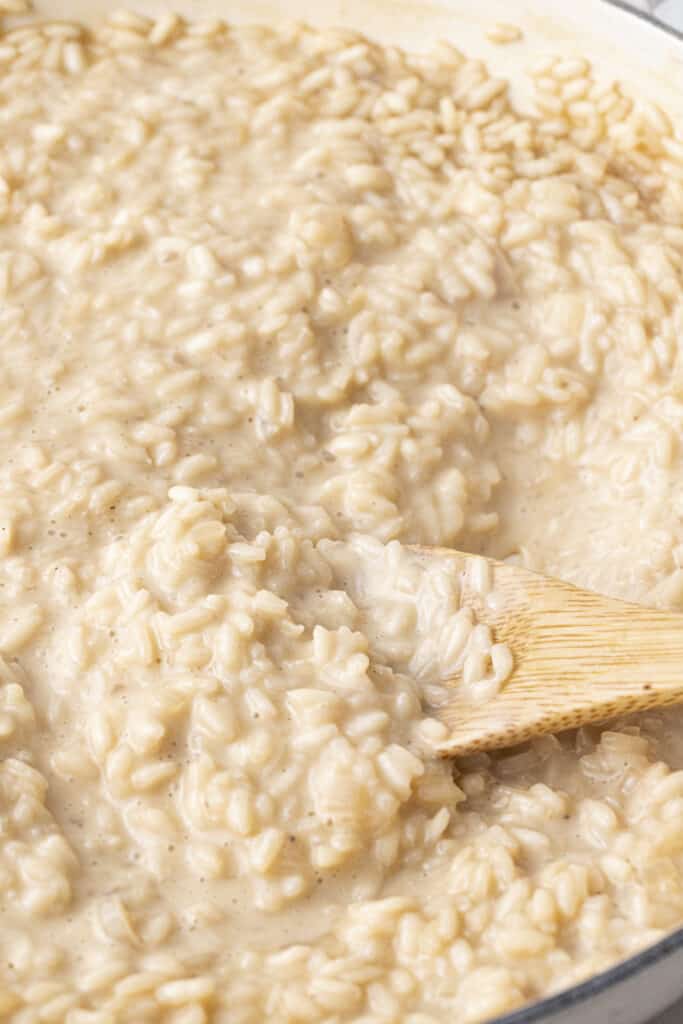
Step 6: Take the risotto off the heat and continue to stir.
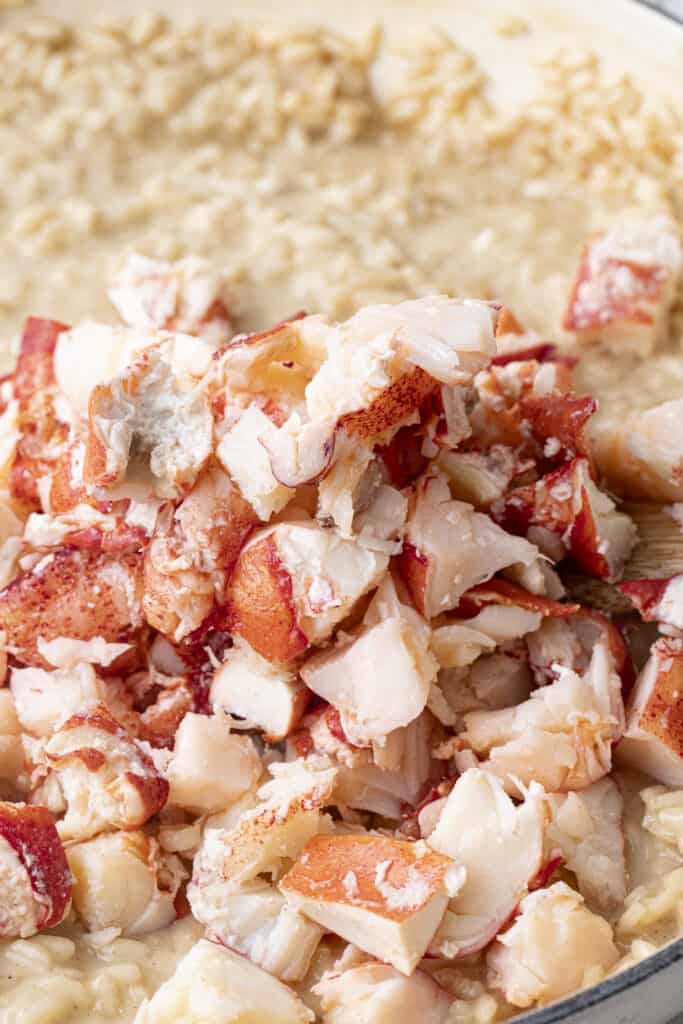
Step 7: Add the reserved lobster meat. Stir gently to combine.
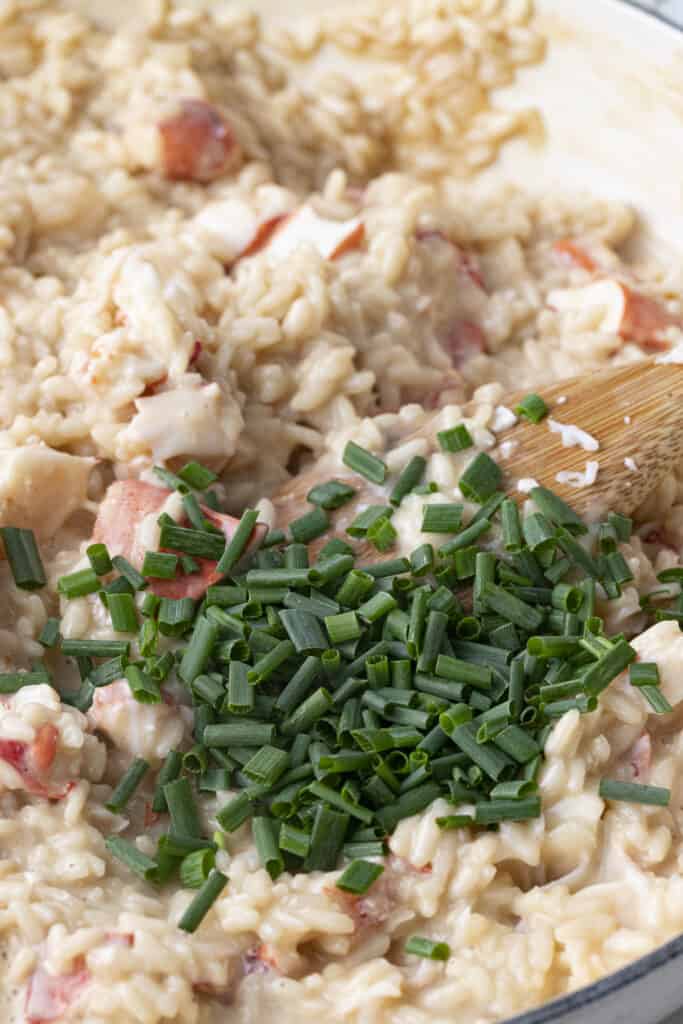
Step 8: Add the chopped chives and mix.
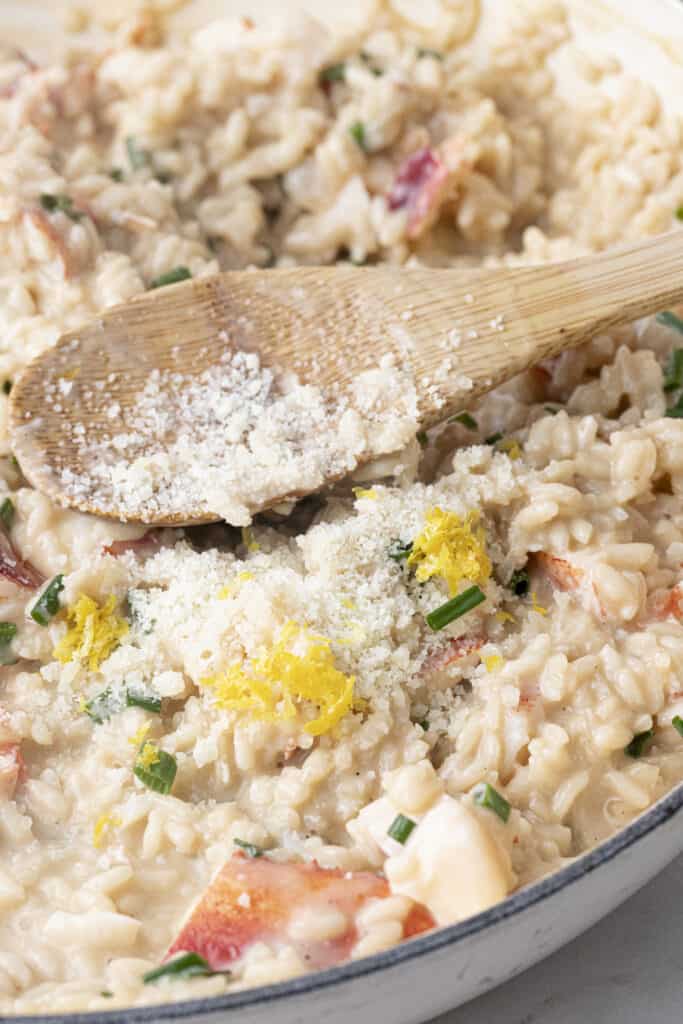
Step 9: Next, add 1/4 cup of grated Parmigiano Reggiano and 1 teaspoon of lemon zest and fold until combined.
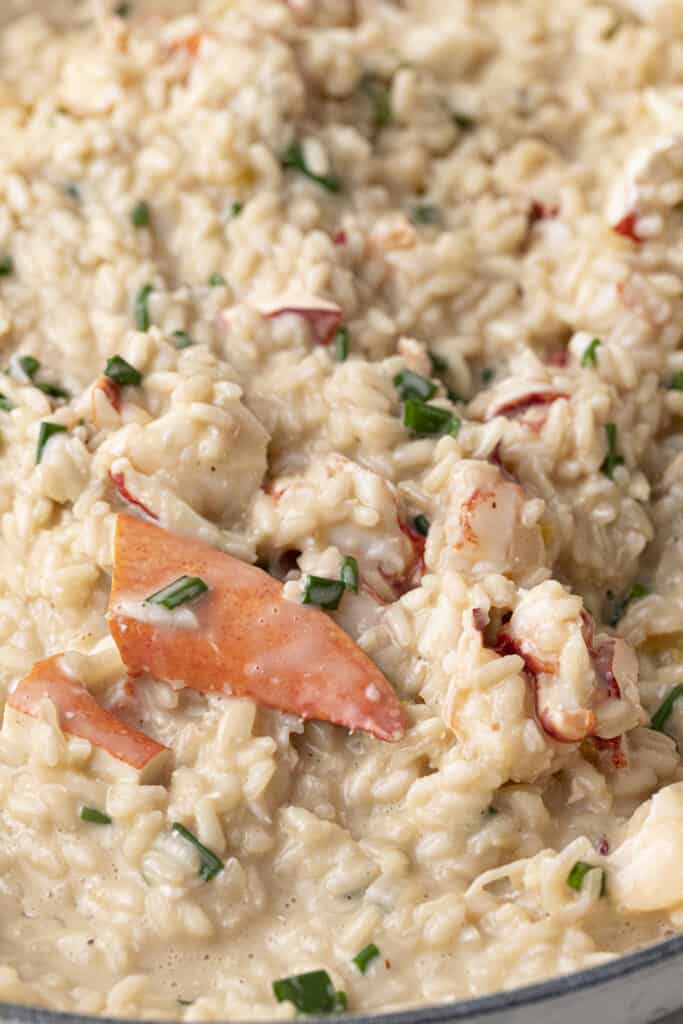
Step 10: Once everything is well combined, serve the lobster risotto hot, garnishing with additional lobster chunks and a sprinkle of chives.
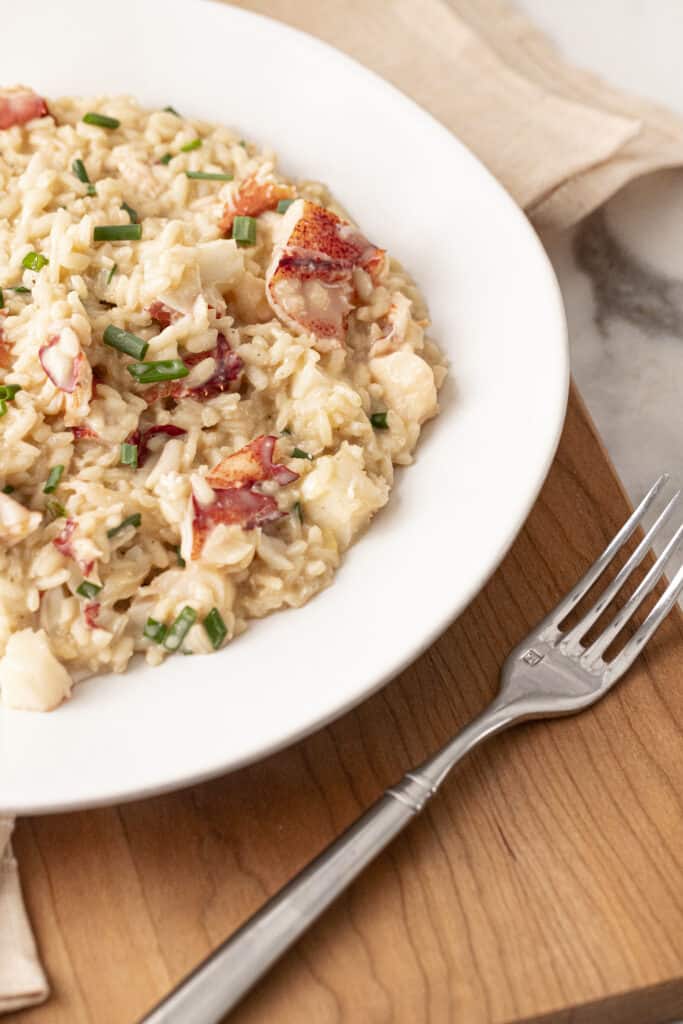
Tips and Notes
- Keep the broth warm – To ensure a creamy texture, keep the lobster stock and water mixture warm in a separate pot. Adding gradually warmed liquid to the risotto allows for efficient absorption, releasing starch from the Arborio rice and creating a velvety consistency without overcooking. This step is crucial for achieving a perfectly cooked lobster risotto.
- Broth amounts – Achieving the ideal flavor requires a total of 5.5 cups of liquid in the risotto. So, I used 4 cups of concentrated lobster stock to intensify the seafood essence, balanced with 1.5 cups of water to subtly dilute the flavor. Alternatively, you have the flexibility to use 5.5 cups of any warm broth or stock, such as chicken broth, allowing you to customize the richness to your liking.
- Perfect timing for lobster addition – Add the cooked lobster meat towards the end of the cooking process, just when the rice reaches the desired al dente consistency. This ensures that the lobster remains tender and doesn’t overcook, preserving its succulence and allowing it to blend seamlessly with the creamy risotto.
Recipe FAQs
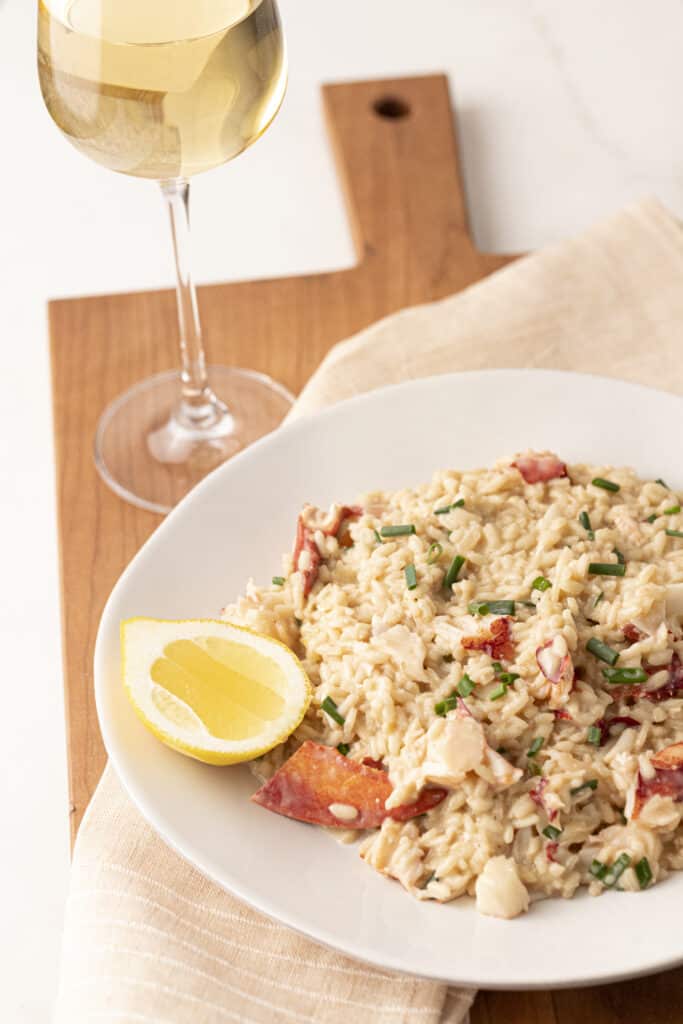
Serving Suggestions
- Wine pairing – Enjoy your lobster risotto with a Burgundy Chardonnay. The Chardonnay’s buttery notes complement the risotto’s richness, creating a balanced and enjoyable pairing. The wine’s subtle acidity enhances the savory flavors for a satisfying dining experience.
- Arancini – Repurpose leftover lobster risotto into arancini. Shape chilled risotto into small balls, coat in breadcrumbs, and deep-fry until golden. These crispy arancini make for delightful appetizers or a creative way to enjoy the flavors of lobster risotto in a different form.
- Side salad – Serve the lobster risotto with a side salad for a well-rounded meal. Arugula with a lemon vinaigrette or a classic Caesar salad complements the risotto’s richness, providing a crisp and refreshing bite.
- Lemon wedges for brightness – Serve lemon wedges on the side for a citrusy contrast. A squeeze of fresh lemon juice adds a zesty kick!
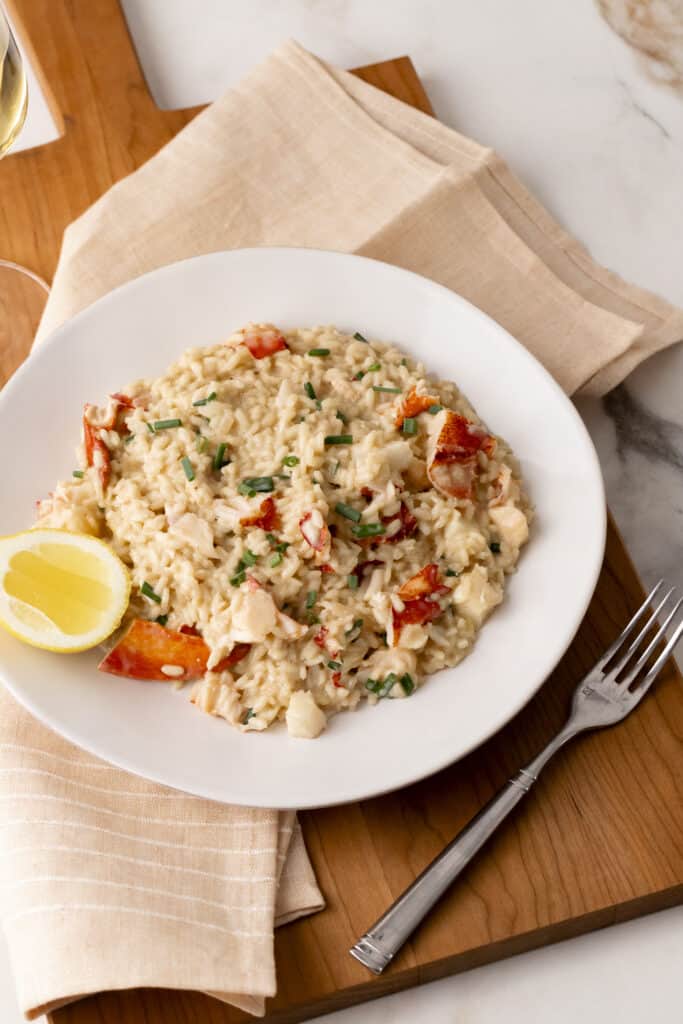
Storage and Reheating Instructions
Storage
- Store any leftover lobster risotto in an airtight container in the refrigerator. Ensure it’s cooled to room temperature before refrigerating. Proper storage helps maintain the quality and freshness of the risotto for up to 2-3 days.
Reheating
- To preserve the creamy texture, reheat the lobster risotto gently on the stovetop over low heat. Add a splash of warm broth or water to restore moisture and stir consistently. Avoid using the microwave to prevent uneven reheating and maintain the velvety consistency of the dish.
Please leave a review if you make this recipe! Don’t forget to follow @seasonedandsalted on Instagram!
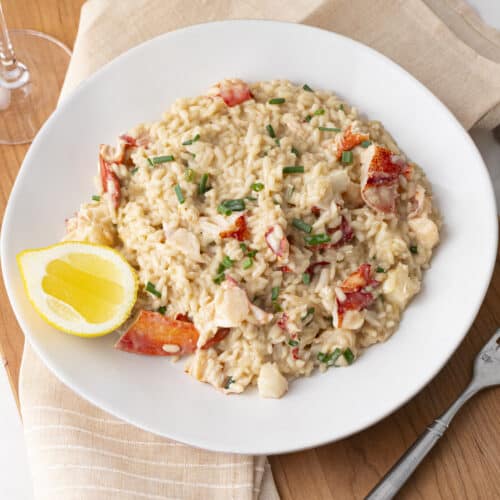
The Best Lobster Risotto Recipe (Easy and Creamy)
Equipment
- Large pan
- pot
- ladle
- cutting board
- Knife
- Grater
- measuring cups
- measuring spoons
- Wooden Spoon or silicone spatula
Ingredients
- 1 pound lobster meat cooked and chopped
- 2 cups Arborio rice
- 1/2 cup dry white wine
- 1 shallot minced
- 4 small garlic cloves minced
- 2 tablespoons unsalted butter
- 1 tablespoon olive oil
- 4 ounces mascarpone
- 8 chives chopped
- 4 cups lobster stock (you can also use 5 1/2 cups low sodium chicken broth instead of the lobster stock and water below)
- 1 1/2 cups water (ONLY if using homemade lobster stock)
- 1/4 cup grated Parmigiano Reggiano
- 1 teaspoon lemon zest
- 1 teaspoon salt
- 1 teaspoon pepper
- Squeeze of lemon
Instructions
- In a large pan, melt 2 tablespoons of butter along with 1 tablespoon of olive oil over medium heat. Sauté 1 minced shallot and 4 small cloves of garlic until softened.
- Add 2 cups of Arborio rice to the pan, toasting it for a couple of minutes until it becomes slightly translucent around the edges.
- Pour in 1/2 cup of white wine, stirring continuously until it’s mostly absorbed by the rice. Season with 1 teaspoon of salt and 1 teaspoon of pepper
- In a separate pot, keep the lobster stock (4 cups) and water (1 1/2 cups) mixture warm over low heat. Begin adding this mixture to the rice one ladle at a time (about 1/2 cup per ladle), stirring frequently. Allow the liquid to be mostly absorbed before adding the next ladle.
- Continue this slow-cooking process until the rice is al dente and has a creamy consistency. This should take about 18-20 minutes.
- Stir in 4 ounces of mascarpone until well combined.
- Add the reserved lobster meat. Stir gently to combine.
- Add the chopped chives and mix.
- Next, add 1/4 cup of grated Parmigiano Reggiano and 1teaspoon of lemon zest and fold until combined.
- Once everything is well combined, serve the lobster risotto hot, garnishing with additional lobster chunks and a sprinkle of chives.
Notes
- Keep the broth warm – To ensure a creamy texture, keep the lobster stock and water mixture warm in a separate pot. Adding gradually warmed liquid to the risotto allows for efficient absorption, releasing starch from the Arborio rice and creating a velvety consistency without overcooking. This step is crucial for achieving a perfectly cooked lobster risotto.
- Broth amounts – Achieving the ideal flavor requires a total of 5.5 cups of liquid in the risotto. In my recipe, I used 4 cups of concentrated lobster stock to intensify the seafood essence, balanced with 1.5 cups of water to subtly dilute the flavor. Alternatively, you have the flexibility to use 5.5 cups of any warm broth or stock, such as chicken broth, allowing you to customize the richness to your liking.
- Perfect timing for lobster addition – Add the cooked lobster meat towards the end of the cooking process, just when the rice reaches the desired al dente consistency. This ensures that the lobster remains tender and doesn’t overcook, preserving its succulence and allowing it to blend seamlessly with the creamy risotto.
